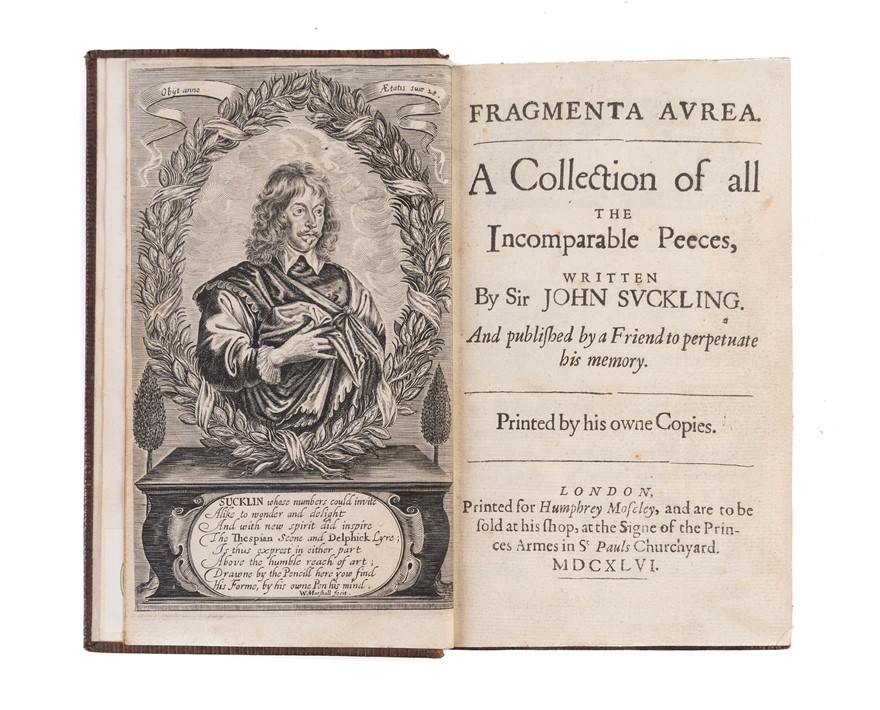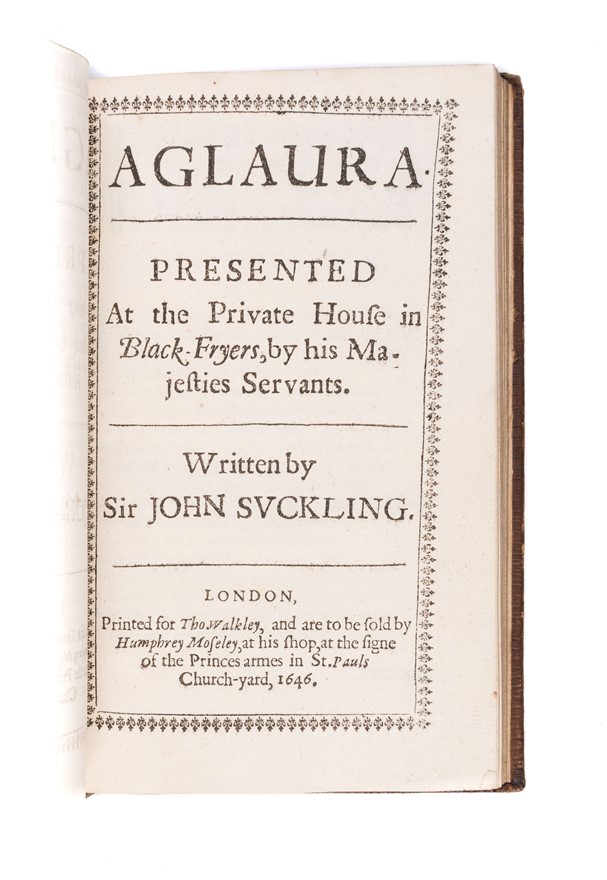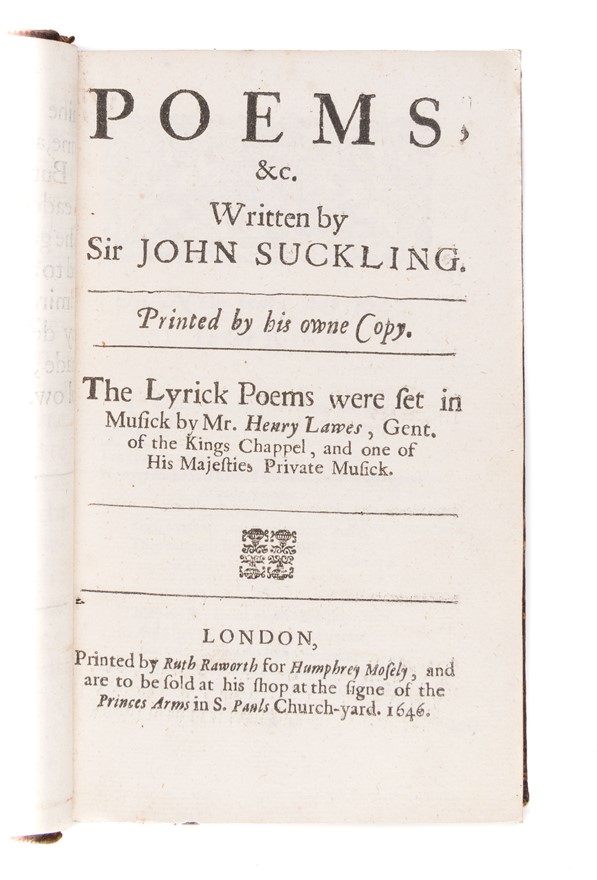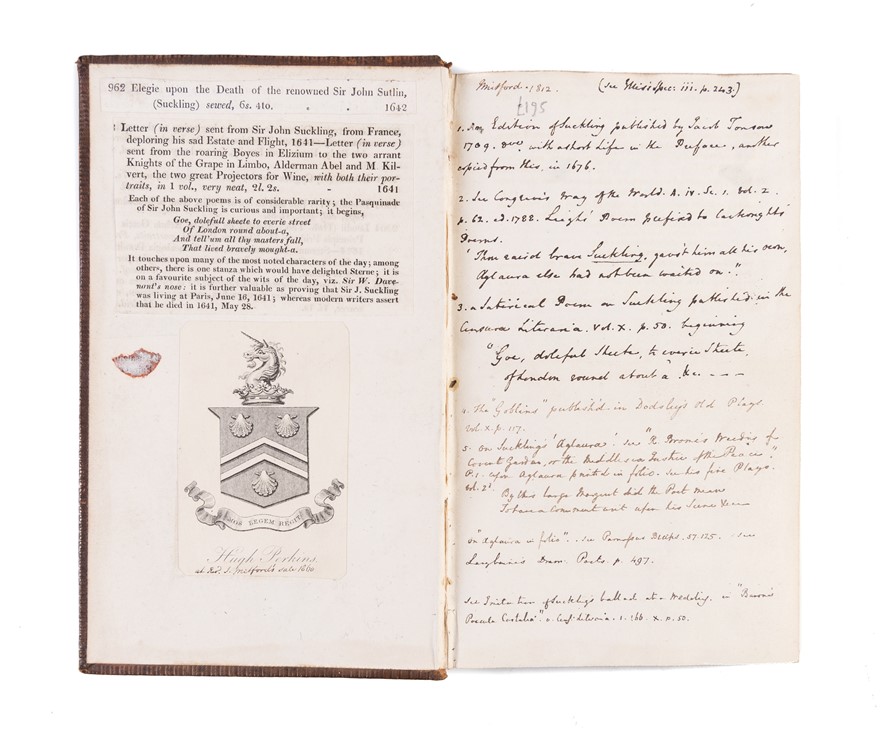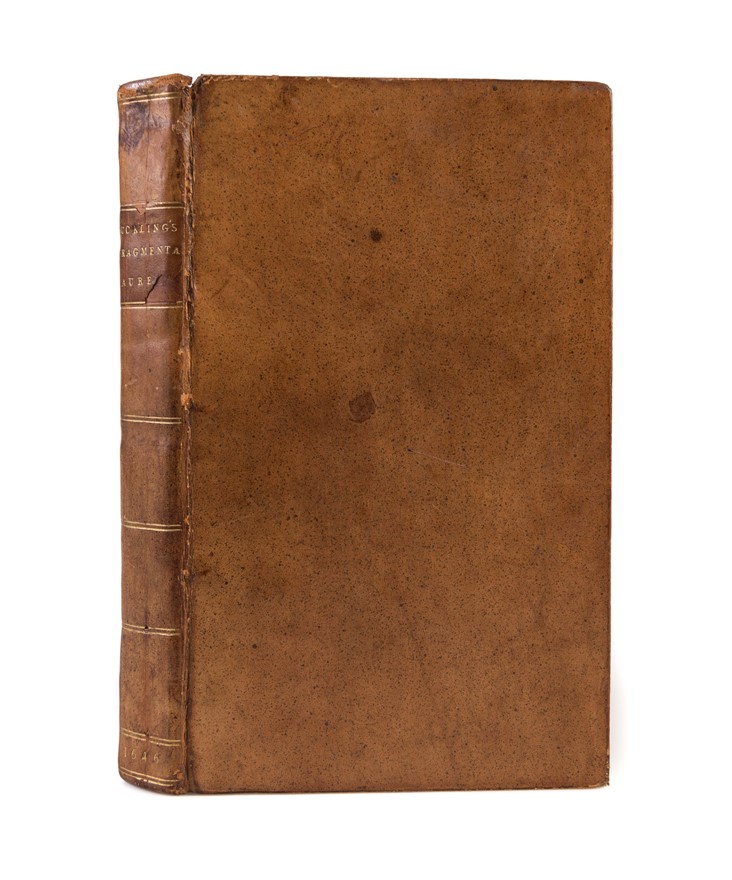Fragmenta Aurea. A Collection of all the Incomarable Peeces, written by Sir John Suckling.
SUCKLING Sir John (1646.)
£2500.00 [First Edition]
Please contact us in advance if you would like to view this book at our Curzon Street shop.
A FINE COPY OF AN IMPORTANT COLLECTION OF VERSE
And published by a Friend to perpetuate his memory. Printed by his owne Copies.
First Edition. 8vo. [Text 179 x 105 mm]. [viii], 119, [1 blank], [vi], 82, 64, [iv], 52 pp; engraved frontispiece half-length portrait by William Marshall on A1v. A good, clean copy, with a few page numbers just touched by the binder. Late 18th/early 19th-Century plain lightly-sprinkled calf, spine ruled in gilt (joints slightly rubbed, spine-label chipped).
London: [by Ruth Raworth & Thomas Walkley] for Humphrey Moseley,
Wing S6126; Pforzheimer 996; Hayward, English Poetry, 84. The first state (A) of the title with the first two words in even upper-case letters and a rule beneath the date and the incorrect spelling "allowred" on A3v. The second state of the title to Aglaura with the imprint "for Thomas Walkley, and are to be sold by Humphrey Moseley" (the first state has Walkley's initials). William Marshall's engraved portrait is derived from Van Dyck's full-length portrait of Suckling holding a folio of Shakespeare open at Hamlet, now in the Frick Collection, New York, the only known portrait of Suckling. It is the first state, before the addition of some heavier re-incised lines. L. A. Beaurline & Thomas Clayton, "Notes on Early Editions of Fragmenta Aurea," in Studies in Bibliography, 23 (1970), pp. 165-70.
Fragmenta Aurea is a collection of 32 of Suckling's poems (47pp.), 29 "Letters to divers Eminent Personages" (44pp.), "An Account of Religion by Reason. A Discourse upon Occasion presented to the Earl of Dorset" (17pp; on Socinianism), and three plays ("Aglaura" [with the alternative final act], "The Goblins A Comedy" and "Brennoralt A Tragedy"). This miscellany comprises the bulk of Suckling's attributed works - a number of poems in particular and another dramatic piece were added to later editions. It was published by Humphrey Moseley, a most interesting bookseller who is closely connected with the dissemination of royalist texts during the dark years of the Commonwealth, including works by Davenant, Vaughan, Carew, Beaumont & Fletcher, Benlowes, Brome, Cartwright, Cowley, Donne, Fanshawe, Sherburne, Stanley, Stapylton and Waller.
Sir John Suckling (1609-?41), soldier, courtier, gambler, and roisterer occupies a place as one of the consummate "cavalier poets", though his death, in poverty and probably by his own hand as an exiled traitor to Parliament in Paris, took plate shortly before the Civil War broke-out. Fragmenta Aurea, published some six or seven years after his death, re-fashioned Suckling as a gentleman and royalist martyr, creating a reputation later in the 17th Century as a poet to be compared with Shakespeare, Jonson, Dryden, and Donne (John Stubbs, Reprobates: The Cavaliers of the English Civil War, 2011, p. 465).
"[He] grew famous at Court for his readie Sparkling witt; which was envyed, and he was (he sayd) the Bull that was bayted: he was incomparably readie at repartyng, and his witt most sparkling when most sett-upon and provoked. He was the greatest gallant of his time; and the greatest Gamester, both for Bowling and Cards." (John Aubrey, Brief Lives).
"Suckling made his mark as a poet, playwright, and belletrist, but he was a writer mainly by avocation, and by second nature. He was first and last a wit and a courtier to Charles I, being occupied mainly as a gentleman officer, socio-political observer, gamester, amorist, and marital fortune seeker - often impetuously and not always successfully. Rough times ended his life prematurely: heir at eighteen and prodigal as soon, he died at thirty-two in Paris, penniless and probably a suicide; the Commons judged him a traitor to parliament, to royalists he was a martyr before the king. ... Multiple editions of Suckling's Works or Poems have been published in each of the past four centuries and are in print for the twenty-first. His reputation with readers and critics remained quite high until the last quarter of the twentieth century, when changes in the cultural, and especially academic, climate brought a chillier reception to Suckling and others whose monarchism and patriarchal traditionalism made them personae non gratae in a time when academic preference was for oppositional or subversive writers. It is perhaps helpful to view Suckling in a longer perspective than that of Caroline court culture or modern academic fashions. Although Suckling is not of the comparable stature of Catullus, Horace, and Ovid, their poetry and ethos provide a liberating context for viewing him, and not just because Catullus died young, Horace never married, and Ovid perished in exile, but because all four live in their poetry and all have the power to move our emotions memorably from beyond the grave with their distinctive curiosa felicitas in verse." (Tom Clayton, ODNB).
Provenance: Rev. John Mitford (1759-?), with his signature dated 1812, sale, Sotheby, 1860. Armorial bookplate of Henry Perkins (1778-1855), brewer, of Springfield, Surrey, and Hanworth Park, Middlesex, but acquired by his son Algernon Perkins (d. 1873), with ink purchase note on the bookplate "at Revd. J. Mitford's sale 1860", not in the sale, Gadsden, Ellis & Co., at Hanworth Park, 3+/6/1873.
Stock Code: 54325
